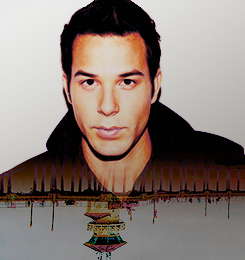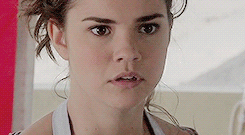Outside the Lines [Frumtum]
Jan 5, 2015 0:59:01 GMT -5
Post by Deleted on Jan 5, 2015 0:59:01 GMT -5

I think what sets us apart is the way we see the world.
I know it’s not that easy to hear, being that there’re so many different views of the same thing. Even here, in the cramped little spaced tucked down the hall, the world comes at me like a cracking glass. Each new eye brings another crack. First there’s what you see, then the slice of someone new. It’s not hard to see how the whole world suddenly piles on, and the glass shatters to pieces. When we put so much force on defining who we are, we don’t think about breaking down the bits that other people make. We’ll grind them up into dust before they get to shine a whole way new. I try my best to keep back, to let other people make the cracks in the mirror because I know, and I’ve seen how many different edges of the world there are. No sense in carving up such a small, tiny space. That limits you to just one little peephole of what’s fabulous and new—what’s great and what’s daring. Life is the sum of all those pieces, sewn together in one thick, empty pane of glass. We’re just breaking something beautiful by focusing on one, tiny spot.
The fever came after the vomiting, and the blurriness after that. Someone must have taken me back to the room with all the pretty flashes of lights—I wish I could’ve kept them in my hands, the warm reds, greens, and blues. They reminded me of the feathers of the birds we saw outside of District Eight. A bright, red little bird was squawking on the tops of an evergreen, until a blue bird came swooping down to silence the noise. And I thought—well, just isn’t that how life is? Making your own noise until someone else decides that they want to cut it short. They say that animals and children never lie, and so I’ve put a lot of faith into seeing just what they have to say. People don’t want to admit that the little flecks of life floating in their eyes is any bit as meaningful as the deepness humanity brings but—I’ve got as much from them as anyone else.
It’s cold, now.
I was swimming through black. A big, deep sea of warm black that covers over my eyes and makes me think that the ending is indeed better than the beginning. You got a definite warm feeling that floods through you, heavy like a blanket, to make you comfortable. The sweat might drip but you give in to what you think is taking over. Sleep or worse, there’s no fighting the heavy, the darkness that’s not good or evil—just a speck that grows into everything, from here to there. Peace. That’s what came next, the good and the bad, the shrinking feeling that there was nothing and wouldn’t ever be anything after. You get afraid, a deep fear that starts through your toes and runs up, up and out of your eyes until you want to shriek. No breath, nothing but empty space that stretches on forever. And I think, I think that this is—an empty space. A nothing but me, a world that isn’t either or was. And that fear, that shrinking little fear is beaten back by emptiness: a lonely, hollow little place where no thoughts live.
Rum Tum.
I see her first. The woman with the long, brown hair, and kind eyes. The one who shared the world, forwards and backwards with me. My mother is as she was—beautiful, thin, and tired. We’re walking the old trails outside of District Twelve, and she’s stepping forward, holding my hand. I’m all of five and she’s whistling a song, laughing at the birds that cluck back at her. I look up at the sky and get lost in the glare of the sun. The trees go up a long hill, filled with green of leaves and flush with the scent of rain. Farther still, a lake reflects back the diamonds of the sun. Yellow and white, dancing forever in the warmth of the afternoon. I’m tired, my little legs are tired, mama I say to her. But she keeps whistling, keeps pressing her feet forward so that we don’t have to stop in the middle of the forest. Just a little further, she says. But it’s always a little further! I say. She looks back at me and brings a hand up to my chin. Those eyes are the same ones that used to watch me at night, through the flames leaping up above our heads. We’d play a game I’d always lose: whose eyes could carry more sleep—and there I was, lids closing, pressed down to darkness.
You never told me about you, My reflection that is not my reflection looks back at me. Benat Izar is atop a hill, and I—can see that there is the brook, and the farm not a ways off. Sampson must be in the reeds somewhere, he’s always not far from his brother! But we are brothers, too. That we came from the same place, He says, and I look back, half expecting to see my mother’s face. He smiles a warm smile, because Benat Izar is always smiling. He was my twin in every sense. Whether stories from Sampson or—a boy whose spirit flew to the stars—I imagine now that we are one in the same. Maybe two halves can’t be separated. I say back, and he nods his head. Maybe we were never meant to be apart in the first place. That is, when the world decided that he could not win, and that I could not win, we were destined to be separate forever.
I don’t know if we would have ever been happy, the four of us trapped in the fields of District Eleven. Benat was to his brother what a dream is; we remember them not as they were, but how they made us feel. Remember that, He says. Remember how they make you feel, And it’s a plea now, his brown eyes wide. And I think about all the faces of the boys and girls that I’ve seen, of the strangers that I’ve talked too on the roads that have lead me—to where? I’m not quite here and I’m not quite there. That’s all I can think, that I’m not quite one and not quite whole. Lost in what should be beyond, or a dream, or somewhere where I cannot fit.
It’s the truth of my whole life: that I do not fit in any space.
With me, Sampson says, all wide-eyed and small. He coughs and takes my hand. It’s cold to the touch. The snow falls, and the little fire between us begs for more life. You and I got each other. And I smile for him. I am strong and I am brave for him because I know, as all older brothers do, that when we are faced with the truth we have but two choices. We can speak to the head, the part of the body that sullies dreams and chains us down to the earth. And though it can remove barbs and make us strong, it can even make us seen what was not seen—speaking to a head that is fragile threatens to shatter it to pieces. The second is, as all good brothers know: speak to the heart, where we can revel in hope and drink from happiness. Because if your brother is weak, you give him part of you to be strong again. My heart has always been stronger than my mind, so the choice has always been easy. And while we are cold, huddled together we can start to get warm again. We got each other, I repeat, because I want to hear the echo through the woods. I want to feel that for one moment, I’ve found what’s a part of me, a missing piece that I haven’t collected until now. Two brothers, because—we don’t have to be anything more.
And I hear her voice—calling but, through the black, not there. She’s too far away, too much of a speck. Freya Hanig is, and would be a part of my heart, but not my mind. I don’t think I ever want to understand, or figure all of her out because—what would be the fun in that? Where would the heights of high and lows of the lowest appear, to make my heart race and to have me laugh the water out of my nose? But the blackness, this black—do we have to be so distant, from one world to a next? If I’m to be here and she’s to be there, what’s the sense of being anywhere at all? People fuss all the time over love, of how—the heart is purple, the world is more than just the sensation of feeling, of one belonging to another. But I, I, I, seeing her!
If I could tell you, Freya, of why to be happy—of why the world matters more to me when you smile than when you feel nothing at all. But I’m a failure because my answer is simple, and not high philosophy. It’s that, in a place where I’ve never fit, there’s only ever been another who’s been as outside of the inside as me. That doesn’t—and won’t make much difference to me but I know, from the tips of my toes to here, that I, Rum Tum Tugger, was never much more than the figments of who you were.
And what has made me so unhappy, and you, too—is that we let the world tell us that we’re to be happy by being… what the world wants us to be. Well—my happiness has never been in living in between the lines of another person. My joy has been glued to the edges of the lines, of being so far off the map that people struggle to find me. Perhaps, my whole life has been a journey to find where I fit—and I see now, as the world goes dark, and you’re still so very far away, that I’ve been asking for what doesn’t exist. I don’t fit anywhere—and that’s okay. I’m not supposed to fit into to a solitary box, or two solitary boxes, or even seven solitary boxes.
Because the world has been so much more beautiful stopping to take a breath and feeling—with my eyes and my tongue, with my fingertips and my nose—that we are not meant to be that single, solitary piece of glass. We can carve out a single section but we will never be happy with what we see. The limits that this world has put on us, on me—that’s what has made me lose the joy that I’ve always found. And it’s hard, to see that the world can put shock collars on us, can lock us in rooms, or have us married off to men that we will never love. There’s no good answer, I’ve got no good answer to the pain and suffering, but I do have, of all things, the capacity to hope we’ll endure.
We’ll endure.
We’ll endure.
And my eyes flutter, seeing the black fade, the shapes form.































































